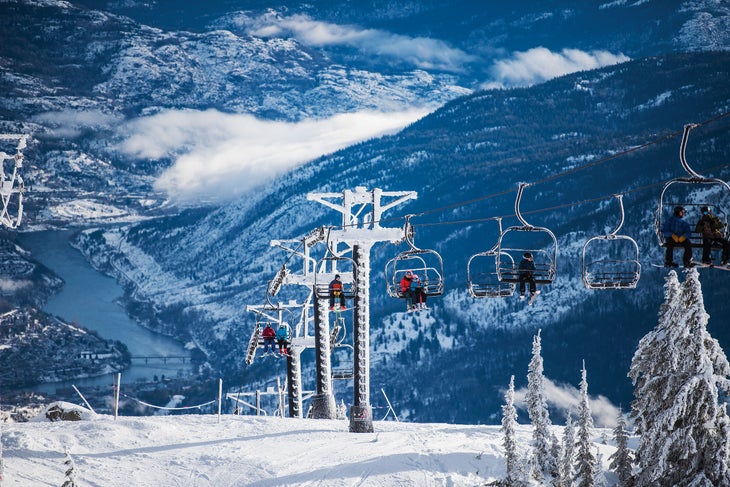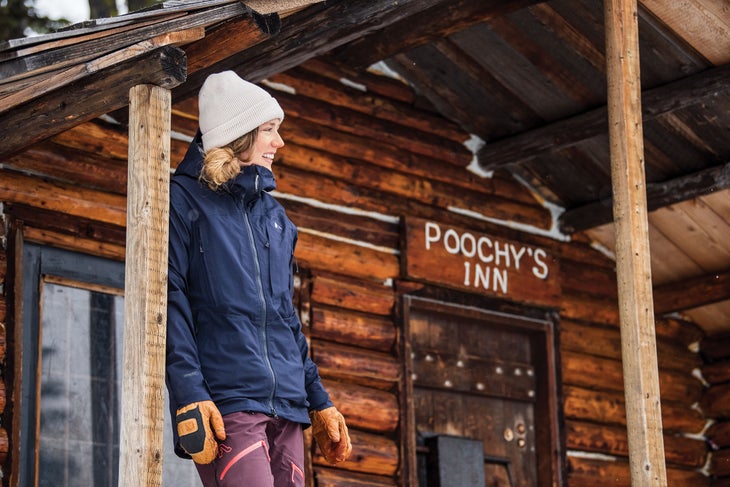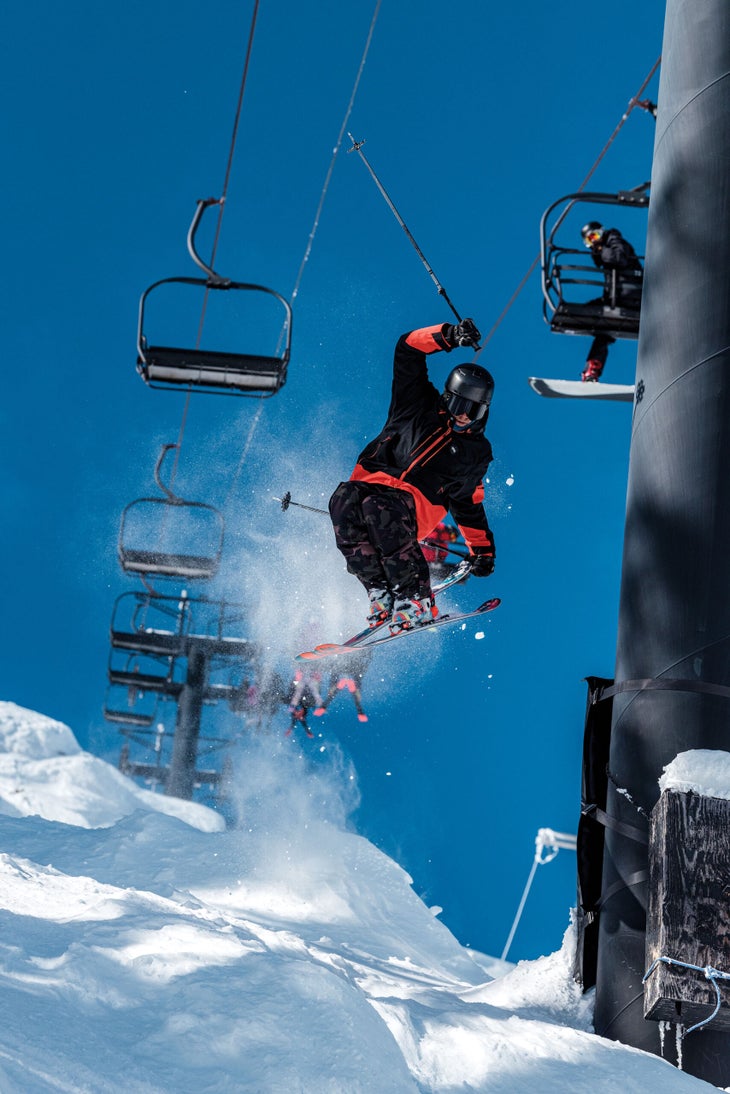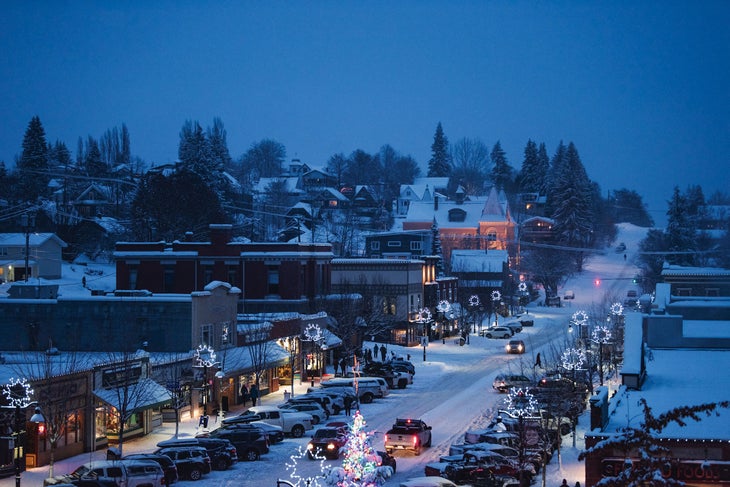Products You May Like
Long before 19th century European miners founded Rossland, B.C., the indigenous Sinixt people called it kEluwi’sst—a word that means “up in the hills.” It’s such a perfect description of the otherworldly realm the town occupies and it calls out the inadequacy of the English language. Try to name a place where fences are made of skis, kids toboggan in the streets, and rooftops hide under 12 feet of drooping snow, and what do you come up with? For lack of any other word, it’s just Rossland, and those who know, know what that means.
Perched high in the dome-like promontories of the southern Monashee Mountains, the storied town was one of the first places on the continent where you could train for Olympic ski jumping back in the early 1900s. But when residents figured out there was 360 degrees of flawless fall line emanating off its marquee peak, Red Mountain, its ski area began a slow and thoughtful evolution. In 1947, Red became the site of Western Canada’s first lift, and today, RED Mountain Resort comprises three whole other mountains—Granite, Grey, and Kirkup—spanning 3,850 acres of some of the most intuitive inbounds tree and pillow skiing in B.C., with a fiercely enduring grassroots vibe.

RED offers booming groomers, piston-pounding bumps, sniper side hits, technical chutes, all wrapped in a vintage vibe. The independently owned resort is thoroughly dedicated to the raw tradition of what it first offered over half-a-century ago.
That’s what first drew Kate Verhagen to this otherwise unlikely corner of B.C.’s Kootenay region five years ago. While such backwater B.C. towns are usually overrun by calloused loggers, this one is instead a storybook mountain town ruled by social misfits: skiers.
“I moved straight here after university,” she says, explaining that she grew up skiing in Alberta and wanted to try Rossland on the advice of a friend. It was an enclave of everything she was looking for.
“I don’t think I’ve ever had as many female friends as I have since I’ve lived here,” she now beams of her adopted home, comfortably housing a mere 3,700 like-minded souls.
To make her mortgage payments, the 31-year-old now does exploration geology remotely from her laptop: drawing maps, collecting data, and planning—all on hardy fiber-optic internet. It’s a work scenario that recalls the original métier the town was founded on, but with a contemporary twist that lets her ski as a central part of her life, and stay connected to the 21st century world at large.
“I think Granite’s probably my favorite mountain,” she says, more excited to talk about skiing than work. Though each peak has its own character, she explains that each has nearly 360-degrees of skiing. But her favorite run remains Link’s Line: a raucous, cliff-strewn trail cut right underneath the Motherlode Chair—where the Canadian Open Freeskiing Championships have run qualifiers for nearly 20 years.

Finding your balance in the modern world, and down double- and triple-stack pillow lines, is something a lot of people are moving to Rossland to undertake. A handful of tech businesses have recently moved to town, capitalizing on its lifestyle benefits in order to mine happier, more productive employees.
Oliver Brayshaw is one of those people. He’s the I.T. manager for ThoughtExchange, a software company that employs 200 people, and now has an office in Rossland. He and his wife Rachel moved from North Vancouver when his company made it an option five years back. Now their kids, eight and 10, can walk to school, and literally slide home from the ski hill. Rossland is so integrated—not just with skiing, but with the culture of yesteryear—that it feels like an idyllic folk tableau for both skiers and families. With only two main streets, and a small smattering of proud Victorian buildings decorating the quiet burg, everything evokes a tight-knit heritage.
“Having skied Whistler a bunch, and even places like Chamonix, I think one of the cool things about RED is that it doesn’t have this intimidating vibe,” Brayshaw reflects. “You can definitely get into trouble if you want to, but there are no big egos around.”
In other words, you can make the mountain what you want. Just like the town.
Brayshaw says life is so simple and outdoor focused here, he’s barely even noticed the pandemic. That’s an ever more appealing scenario these days, and towns like Rossland are basically sending out homing signals to disenfranchised city dwellers.
Heather and Pete Harwood-Stamper used to be among them. They answered that call when they moved from Seattle in 2019, right before the pandemic. They were on the front end of a wave of migration they’ve since seen explode. The airport in nearby Trail, or even Spokane, is a big part of what facilitates this. Even RED’s CEO lives part-time in California, since San Diego connects directly to Spokane.
“You just see people making these choices to get off the highway of money and the corporate world and choose the lifestyle; I think most of these people have the resources and the education to do that in a remote town,” says Harwood-Stamper, whose job has historically been fixing broken businesses. When the recycling facility in the nearby town of Trail came up for sale, he and Heather saw it as an opportunity to move to Rossland with their two kids, a 15-year-old-daughter and 11-year-old son. So that’s what they did.

For Heather, who’s a teacher, Rossland might even have cured her wanderlust.
“You know, I’m always looking for another adventure, or that’s how it’s always been,” she says. “This might be the first time in my life that I think I’ll be here for quite some time. I’ve never felt a community that brought you in and really was as strong as this.”
Admittedly, the Seven Summits Centre For Learning has been a big part of that. It’s a school facility that lets her daughter train for ski racing seven days a week while still in school. But her favorite example of the community was when a retired neighbor helped her daughter build a chicken coop with scraps; and now all the other neighbors feed those chickens with their compost.
People take care of each other here.
According to Verhagen, there’s a balance to be struck with that—especially when it imports white-collar wealth—but she loves welcoming new people into the fabric of the same community she’s found. And so far, she says, it hasn’t put a dent in her or anyone else’s lifestyle—or powder days. Even with the resort being on the Ikon Pass, lift lines are still basically not a thing (minus the morning bottleneck on pow days).
“There’s definitely an influx of people coming, and even just buying my house this year and watching the real-
estate market since I’ve been here, things are going quickly and there’s a lot more new faces in town,” she says. “But the town itself doesn’t seem to be changing too much, which is nice.”
In a time when most everything else is, that’s saying a lot.
Where to Stay in Rossland

Ask Liz Day where to stay in town, and she’ll be quick to recommend the Josie Hotel. She is, after all, its marketing manager. But she’s also a humble Rosslander at heart, and knows different strokes appeal to different folks when it comes to crashing in her town. Here, Day shares her top picks for where to stay in Rossland.
Josie Hotel
The hotel is brand-new, and its ski-in/ski-out boutique luxury appeal is hard to beat, complete with concierge service and staff that warm your boots and have your skis waiting outside for you.
Nowhere Special Hostel
Usually Day’s friends stay with her, but if not, the on-hill budget option is the Nowhere Special Hostel, owned by RED. It’s also new, has a quirky vibe, and is a great option for groups.
Resort Condos
There’s a pool of condos available for rent via RED right up at the mountain. All offer up hot tubs and amenities galore, and are great for families.
Flying Steam Shovel Inn
Down in town, the updated Flying Steam Shovel Inn gives you a taste of history and great staging to cruise the streets and pubs.
Where to Eat + Drink in Rossland
As the manager of the Flying Steamshovel Gastropub, Dan D’Amour has been booking concerts in Rossland for over 10 years, and he still hasn’t gotten bored. With weekly musical acts drawn from Vancouver, Spokane, and Calgary, big city tunes and late-night brews have been keeping his place rocking (in non-pandemic times) for a hundred years. “When you’re done skiing for the day you should hit up Rafters, though,” he insists. That’s the pub built into the attic of the resort’s day lodge, and is revered as the best ski hill bar in Western Canada. You literally crawl through the rafters to get around some corners, but a bouncy dance floor and musical outbursts also make it home to late-night ass-shaking. When you get back down to town, which is uniquely only minutes away from the mountain, Clansey’s is the go-to, but don’t forget, the Rossland Beer Company also has a tasting room.
Where to Ski in the Backcountry around RED Mountain Resort
Ask around Rossland for the most seasoned advice on backcountry skiing and you’ll find no greater authority than the local legend known simply as Dilly. A 20-year-veteran of Rossland’s search and rescue, Dilly still logs more miles than just about anybody. He shares his favorite ways to get around the resort and beyond on skis.
Old Glory
Old Glory is the biggest objective around, says Dilly, and you can tour most anything in the Rossland Range from the highway. Near the resort, you’ve got Mount Roberts and Record Ridge. It’s mostly treeline, low-angle skiing, but 1,000-foot runs are not uncommon.
Mount Kirkup
For a mechanized option, you can get $10 snowcat rides up Mount Kirkup from RED, or you can visit Big Red Cats for the area’s only full-service backcountry experience.
Backcountry Huts
The Friends of The Rossland Range Society also operates a series of brand-new backcountry huts that serve as light ski touring or Nordic skiing bases, with a robust map available on their website. Dilly recommends the Eagle’s Nest or Octagon, but Dilly’s favorite hut is the Igloo.
Strawberry Pass
“Strawberry Pass has a lot of amazing skiing,” Dilly says, noting that the heavily treed terrain can be complex and you can easily get suckered down the wrong drainage. For those looking for guidance, Summit Mountain Guides is a great local option.
More Deep-Dive Travel Coverage From SKI
You Don’t Have to Be a Freeride World Tour Skier to Notch Some of Chamonix’s Classic Descents
Get Lost—or Found—at Lake Tahoe’s Mega Resorts and Quirky Mom-and-Pop Hills
